Global banking crisis: It's one problem down, too many others left to go
From CNN's David Goldman
The stunning and rapid takeover of Credit Suisse, orchestrated by Swiss authorities Sunday, took one giant, wobbling domino off the table. Hours later, a group of central banks from around the world boosted the movement of US dollars through the global financial system to keep loans flowing to households and businesses and support the world's major economies.
The question investors and nervous customers want answered this week: What's next? Are other banks about to fall -- or be saved? Will regulators be forced to step in with more rescue plans?
Some regional banks have teetered on the brink over the past week, with anxious customers pulling tens of billions of dollars in cash from the smaller banks and placing them with bigger institutions that are better capitalized.
To pay customers their withdrawals, regional banks have scrambled to access enough cash. First Republic received a $70 billion loan from JPMorgan Chase a week ago and another $30 billion lifeline on Thursday. That still appears to be insufficient, with First Republic's shares tumbling another 33% Friday.
Many other banks, the identities of which will likely remain unknown for quite some time, sought emergency loans from the Federal Reserve over the past week. Banks borrowed a record $153 billion from the Fed's discount window last week -- a last-resort option for banks to gain quick access to cash.
The good news: Those loans do not indicate anything inherently wrong with the global banking system. None of the banks that borrowed from the Fed's discount window borrowed on secondary credit terms -- emergency, overnight loans that help deeply troubled banks keep the lights on. Those loans come with severe restrictions and more oversight from the Fed.
The fact that the loans the Fed delivered were primary credit "indicates that US bank supervisors consider the banks that needed emergency support 'healthy' and not at elevated risk of imminent failure," noted Jill Cetina, Moody's analyst, in a note to investors Friday.
The bad news: Banks may be healthy on the whole, but all that borrowing shows just how much strain is on the financial system at the moment.
Strain means banks may be resistant to lend money, adding more scrutiny to the creditworthiness of borrowers. That means fewer mortgages and less money flowing to businesses, which could slow the global economy.
That's why central banks stepped in on Sunday. Their coordinated action, the likes of which the world hasn't seen since the European debt crisis a decade ago, represents the first indication that the banking crisis could have long-lasting and damaging effects to the global economy.
-- CNN's Matt Egan and Phil Mattingly contributed to this report
Deutsche Bank says "near zero" exposure to Credit Suisse’s worthless debt
From CNN's Mark Thompson
One of Europe’s leading banks moved quickly Monday to reassure investors that it wasn’t holding significant quantities of a particularly risky type of bonds issued by Credit Suisse.
“Our exposure to Credit Suisse’s AT1s is near zero,” Deutsche Bank said in a statement.
Deutsche Bank had its own share of troubles in the middle of the past decade, but Germany’s biggest bank has rebounded strongly, and last month reported its highest pre-tax profit in 15 years.
Shares in the bank were down 3% on Monday, broadly in line with the wider European banking sector.
Analysts said the surprise move to wipe out Credit Suisse’s AT1 bondholders had unsettled investors, particularly as shareholders – typically the last in line for a payout when a bank fails – would be receiving something.
Some background: AT1s belong to a type of bank capital known as “contingent convertibles.” They are popular with institutional investors because they often offer a higher yield than other bank debt and corporate bonds with a similar rating. However, their “convertible” nature means they can be written down completely, or swapped for equity if a bank gets into distress.
The ongoing global banking crisis will make it harder to get a loan
From CNN's Mark Thompson
Stressed banks will pay much greater attention to the creditworthiness of borrowers, whether they’re businesses looking for loans or home buyers trying to find mortgages.
Christine Lagarde, president of the European Central Bank, told reporters Thursday that “persistently elevated market tensions” could further constrict credit conditions that were already tightening in response to rising interest rates.
CNN's Anna Cooban contributed to this report.
Here's how much it has cost to rescue teetering banks
From CNN's Mark Thompson
Lenders of last resort — central banks — and some of the industry’s strongest players provided huge sums of emergency cash to support teetering banks since the global banking crisis began.
Nearly $200 billion has gone so far in direct central bank support.
In guaranteeing all deposits at Silicon Valley Bank and Signature Bank, the US Federal Reserve is on the hook for $140 billion.
Then there’s the $54 billion the Swiss National Bank offered Credit Suisse in the form of an emergency loan and made hundreds of billions of dollars more available to the combined UBS and Credit Suisse Sunday.
The Fed has also agreed to record amounts of loans to other banks this week. Banks borrowed nearly $153 billion from the Fed in recent days, smashing the previous record of $112 billion set during the crisis of 2008.
Banks also drew on nearly $12 billion of loans from the Fed’s new emergency lending program established at the start of the week with the aim of preventing more banks from collapsing.
The $318 billion the Fed has loaned in total to the financial system is about half what was extended during the global financial crisis.
The banking industry has also coughed up billions. JPMorgan Chase, Bank of America and Citigroup are among a group of 11 lenders providing the $30 billion cash infusion aimed at shoring up confidence in First Republic Bank.
HSBC has reportedly committed more than $2 billion to SVB’s UK business, which it bought on Sunday for £1.
CNN's Anna Cooban contributed to the reporting
A timeline of the global banking crisis: What just happened?
From CNN's Mark Thompson
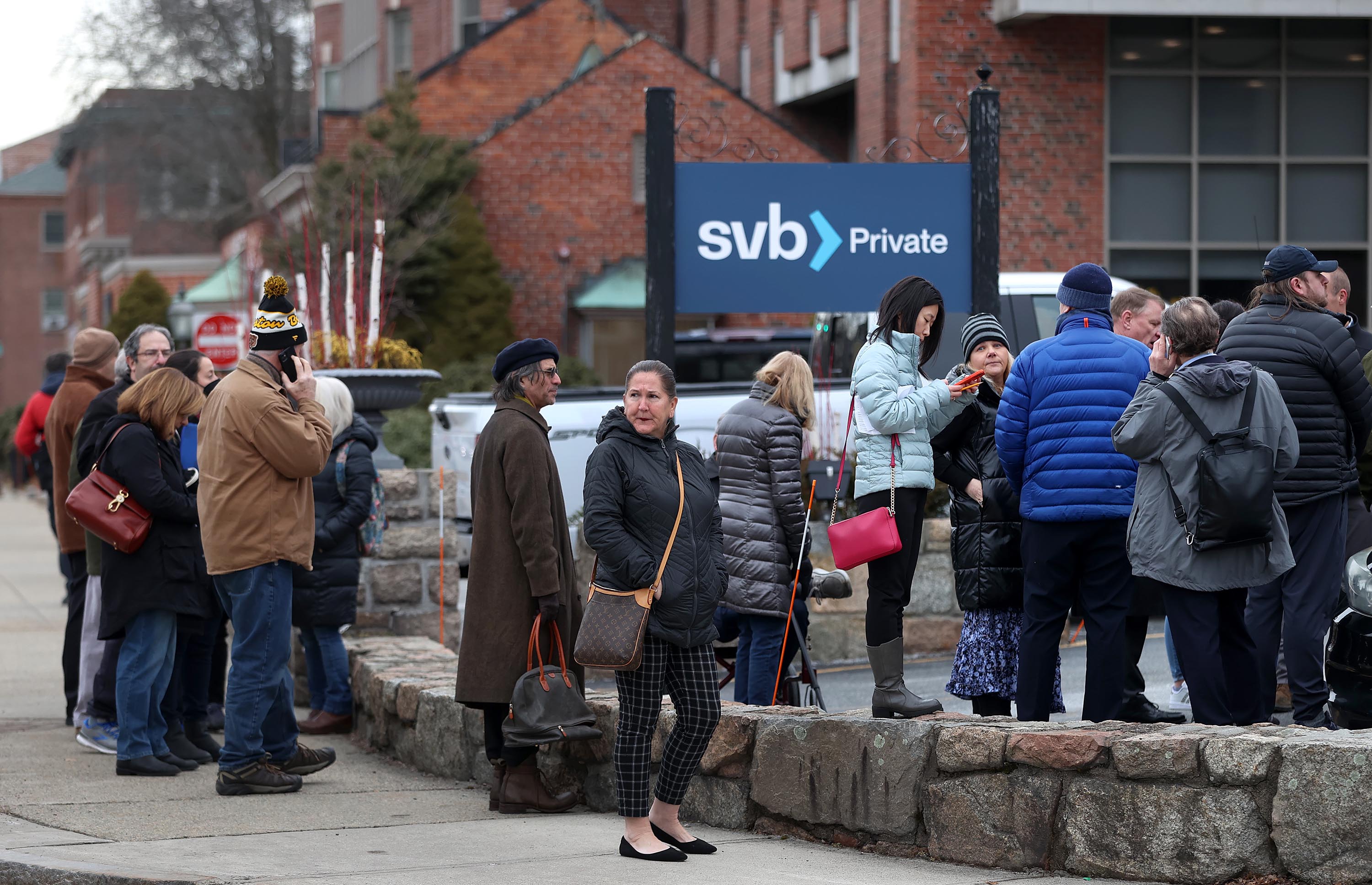 Customers line up outside a Silicon Valley Bank location in Wellesley, Massachusetts, on March 13. (David L. Ryan/The Boston Globe/Getty Images)
Customers line up outside a Silicon Valley Bank location in Wellesley, Massachusetts, on March 13. (David L. Ryan/The Boston Globe/Getty Images)On March 10, the failure of Silicon Valley Bank — biggest since the global financial crisis — was playing out in real time as a major lender to the tech industry succumbed to a classic bank run.
A week on, Signature Bank has been shut down, First Republic Bank has been propped up, and the first major threat since 2008 to a bank of global financial significance — Credit Suisse — has been averted after it was taken over by UBS.
Here's a timeline of what happened:
Friday, March 10: The US government’s Federal Deposit Insurance Corporation (FDIC) took control of SVB. It was the biggest banking collapse in America since Washington Mutual in 2008. The wheels started to come off 48 hours earlier when the bank took a multibillion-dollar loss cashing out US government bonds to raise money to pay depositors. It tried — unsuccessfully — to sell shares to shore up its finances. That triggered the panic that led to its downfall.
Sunday, March 12: The FDIC shut down Signature Bank after a run on its deposits by customers who were spooked by the implosion of SVB. Both banks had an unusually high ratio of uninsured deposits to fund their businesses.
Wednesday, March 15: After watching shares in Credit Suisse collapse by as much as 30%, Swiss authorities announced a backstop for the country’s second-biggest bank. It calmed the immediate market panic but the global player is not out of the woods yet. Investors and customers are worried that it doesn’t have a credible plan to reverse a long-term decline in its business.
Thursday, March 16: First Republic Bank was teetering on the brink as customers withdrew their deposits. In a meeting in Washington, US Treasury Secretary Janet Yellen and Jamie Dimon, the CEO of America’s biggest bank, drew up plans for a private sector rescue. The result was an agreement with a group of American lenders to deposit tens of billions of dollars of cash into First Republic to staunch the bleeding.
Sunday, March 19: Switzerland’s biggest bank, UBS, agreed to buy its ailing rival Credit Suisse in an emergency rescue deal aimed at stemming financial market panic.
FDIC sold most of the failed Signature Bank to Flagstar
From CNN's David Goldman
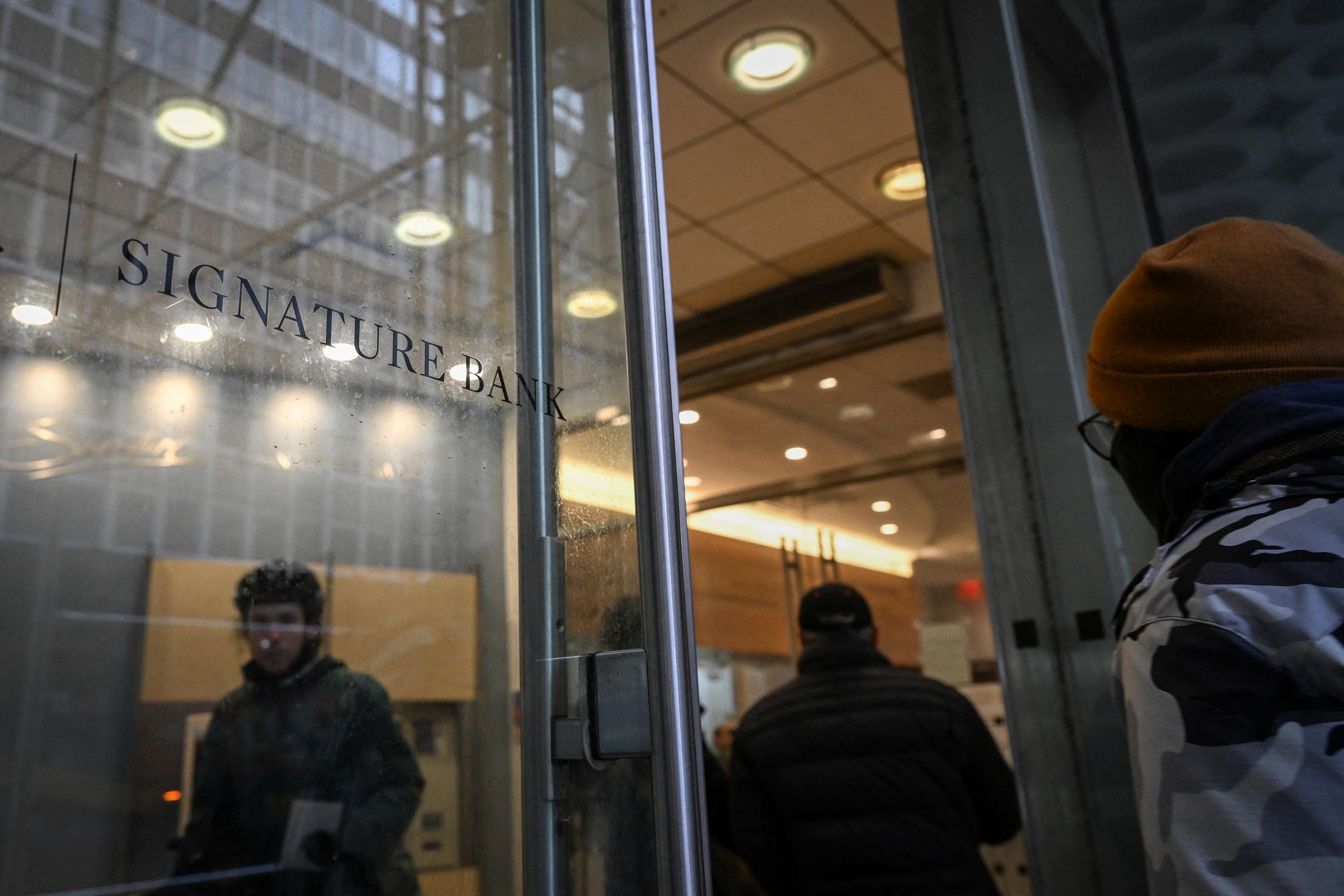 A branch of Signature Bank is pictured in New York, on March 13. (Ed Jones/AFP/Getty Images)
A branch of Signature Bank is pictured in New York, on March 13. (Ed Jones/AFP/Getty Images)A week after Signature Bank failed, the Federal Deposit Insurance Corporation said it has sold most of its deposits to Flagstar Bank — a subsidiary of New York Community Bank.
On Monday, Signature Bank’s 40 branches will begin operating as Flagstar Bank. Signature customers won’t need to make any changes to do their banking Monday.
New York Community Bank bought substantially all of Signature’s deposits and a total of $38.4 billion worth of the company’s assets. That includes $12.9 billion of Signature’s loans, which New York Community Bank purchased at a steep discount — it paid just $2.7 billion for them. New York Community Bank also paid the FDIC stock that could be worth up to $300 million.
At the end of last year, Signature had more than $110 billion worth of assets, including $88.6 billion of deposits, showing how the run against the bank two weeks ago led to a massive decline in deposits.
Not included in the transaction is about $60 billion in other assets, which will remain in the FDIC’s receivership. It also doesn’t include $4 billion in deposits from Signature’s digital bank business.
As the banking crisis spreads, banks have grown increasingly wary of taking on risk. That’s likely why New York Community Bank was unwilling to take on all of Signature’s assets.
The FDIC said Sunday it expects to sell off those assets over time, and the total cost to the government will ultimately be about $2.5 billion.
Global oil tumbles, gold jumps to 1-year high
From CNN's Mark Thompson and Anna Cooban
Global oil prices fell more than 2% early Monday, with US crude trading around $65 a barrel and international benchmark Brent crude around $71, as a selloff in global banking stocks resumed despite dramatic weekend action to shore up confidence.
Stress in the banking industry could slow economic growth, reducing demand for energy, as lenders become warier about extending credit to businesses and households.
Goldman Sachs believes that the American economy has a 35% chance of entering a recession within a year — up from 25% before the banking sector meltdown started.
Meanwhile, gold prices jumped 1.7% to trade at $2,004 per ounce — the highest price since March 8, 2022.
Gold often benefits from increased demand during times of economic uncertainty. It also becomes more attractive to investors when interest rates are low.
The market turmoil unleashed 10 days ago by the collapse of Silicon Valley Bank has prompted many analysts to dial down their expectations for interest rate hikes by the Federal Reserve and Bank of England this week.
European markets open slightly lower amid fears over banking sector
From CNN's Robert North
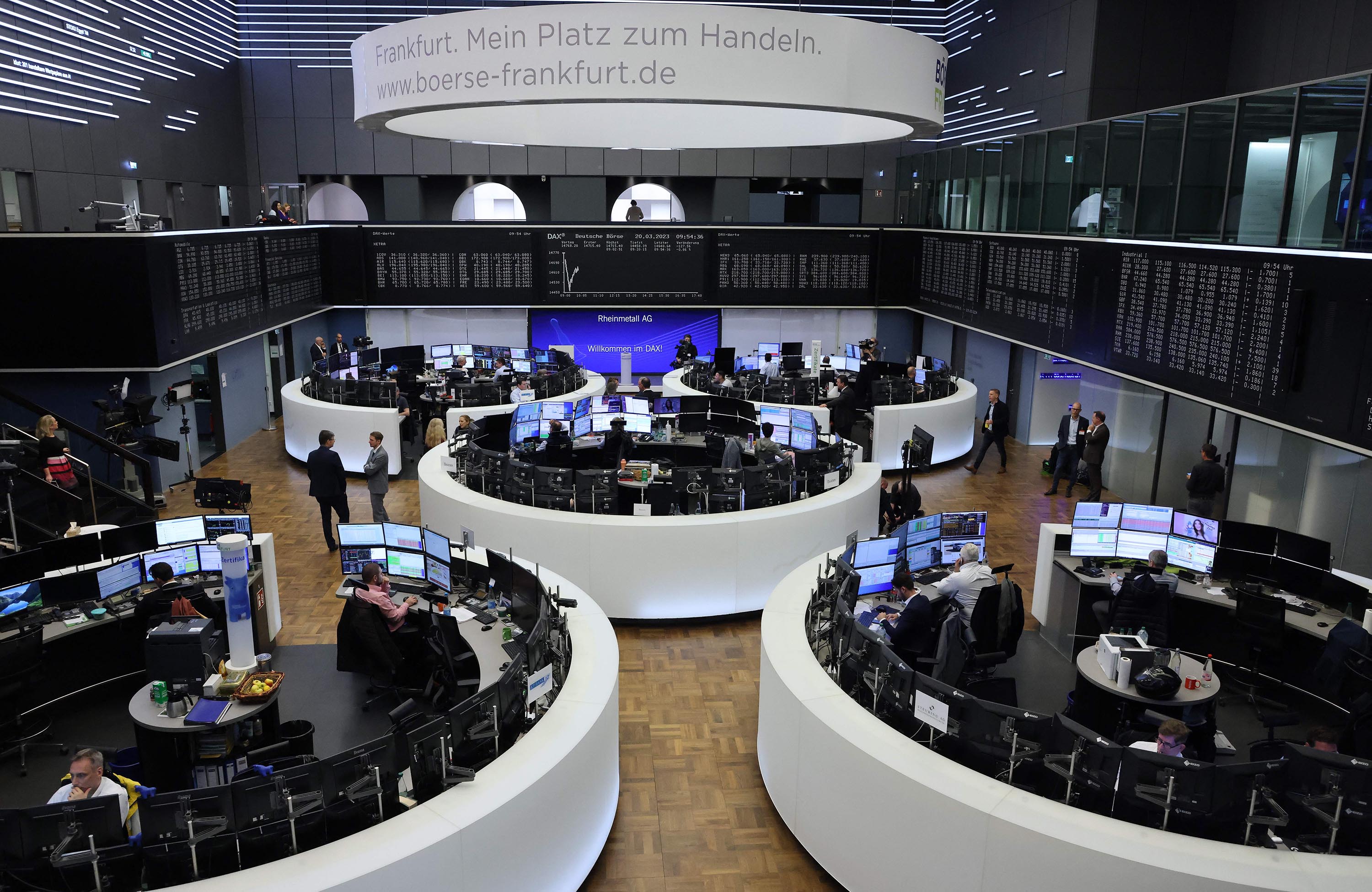 Traders work at the stock exchange in Frankfurt, Germany, on March 20. (Daniel Roland/AFP/Getty Images)
Traders work at the stock exchange in Frankfurt, Germany, on March 20. (Daniel Roland/AFP/Getty Images)European markets have opened lower as concerns over the banking sector remain.
- The FTSE 100 was down just under 1%
- The French CAC 40 was down around 0.25%
- The German Dax was nearly 0.5% lower.
On Sunday, Switzerland's biggest bank, UBS, agreed to buy Credit Suisse in an emergency rescue deal aimed at stemming financial market panic unleashed by the failure of two American banks earlier this month. UBS is paying 3 billion Swiss francs ($3.25 billion) for Credit Suisse, about 60% less than the amount the bank was worth when markets closed on Friday.
Just hours after the deal was announced, the US Federal Reserve and several other major central banks announced a coordinated effort to boost the flow of US dollars through the global financial system with the aim of keeping credit flowing to households and businesses.
Asia Pacific markets dropped after UBS rescue of Credit Suisse
From CNN's Michelle Toh
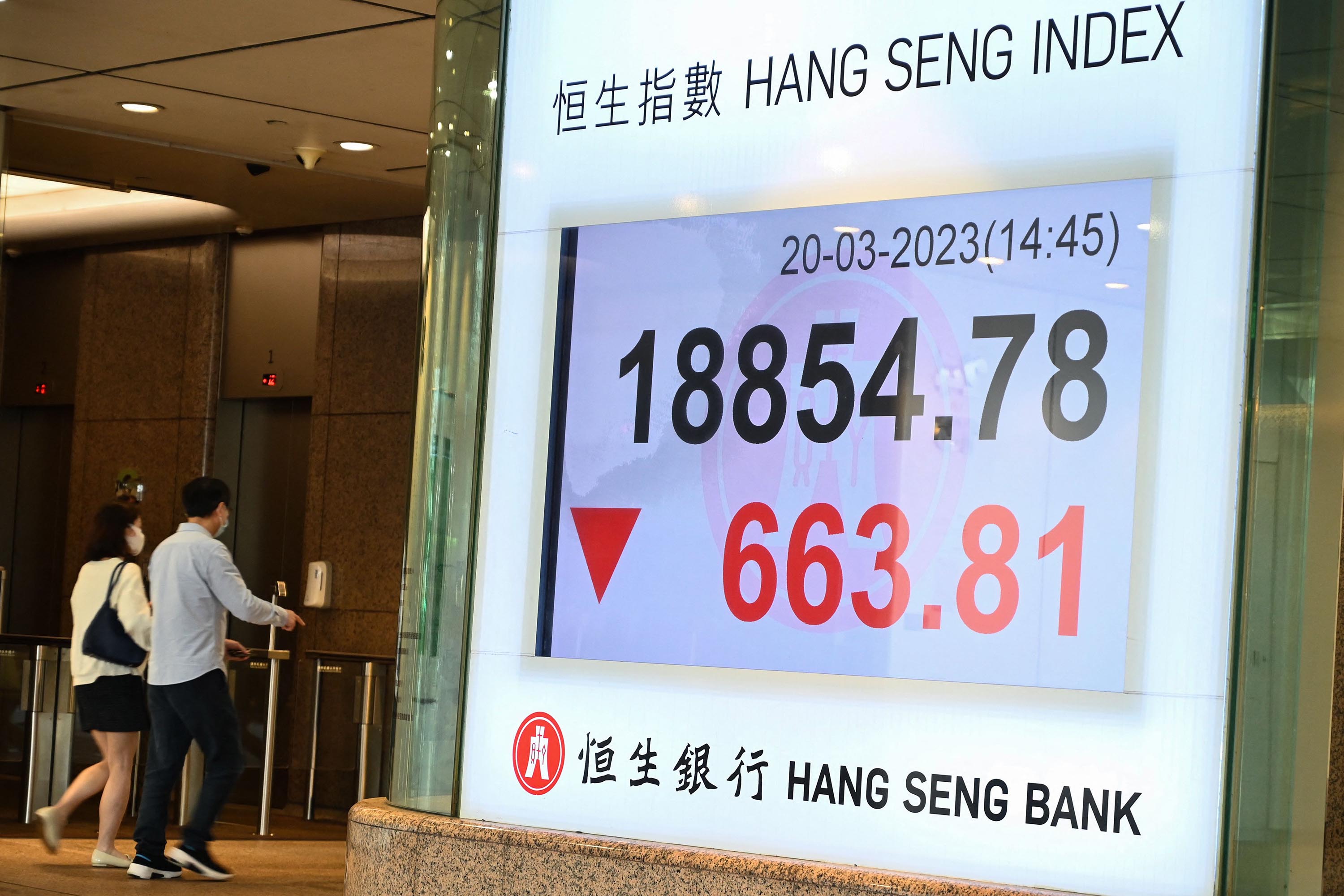 People walk past a sign showing numbers for the Hang Seng Index in Hong Kong on Monday, March 20. (Peter Parks/AFP/Getty Images)
People walk past a sign showing numbers for the Hang Seng Index in Hong Kong on Monday, March 20. (Peter Parks/AFP/Getty Images)Asia Pacific stocks fell on Monday, even as regulators across the region sought to assure investors that their money was safe in the wake of a bailout for Credit Suisse and coordinated efforts by global central banks to boost liquidity in financial markets.
Both lenders are headquartered in London, but make most of their money in Asia.
Stephen Innes, managing partner of SPI Asset Management, said traders were on high alert because “the more policymakers do, the more investors expect more bad news to come down the pipe, which creates a horrible negative feedback loop.”
It’s “almost as if investors are asking themselves, ‘What do they know we do not know?’” he told CNN.
HSBC and Standard Chartered were facing greater scrutiny Monday as two global banks that had also “had their share of ups and downs,” according to Innes.
For Standard Chartered, recent speculation that the bank was a “takeover target” may be weighing on the stock, he said. Standard Chartered’s CEO told CNBC last month that the bank was “absolutely not” for sale.
HSBC, meanwhile, could be subject to investor jitters after buying the UK arm of Silicon Valley Bank, the lender that collapsed earlier this month, Innes said.
But some analysts predicted that markets could pick back up later on Monday if investor nerves settle.
— CNN’s Mark Thompson contributed to this report.
.png)
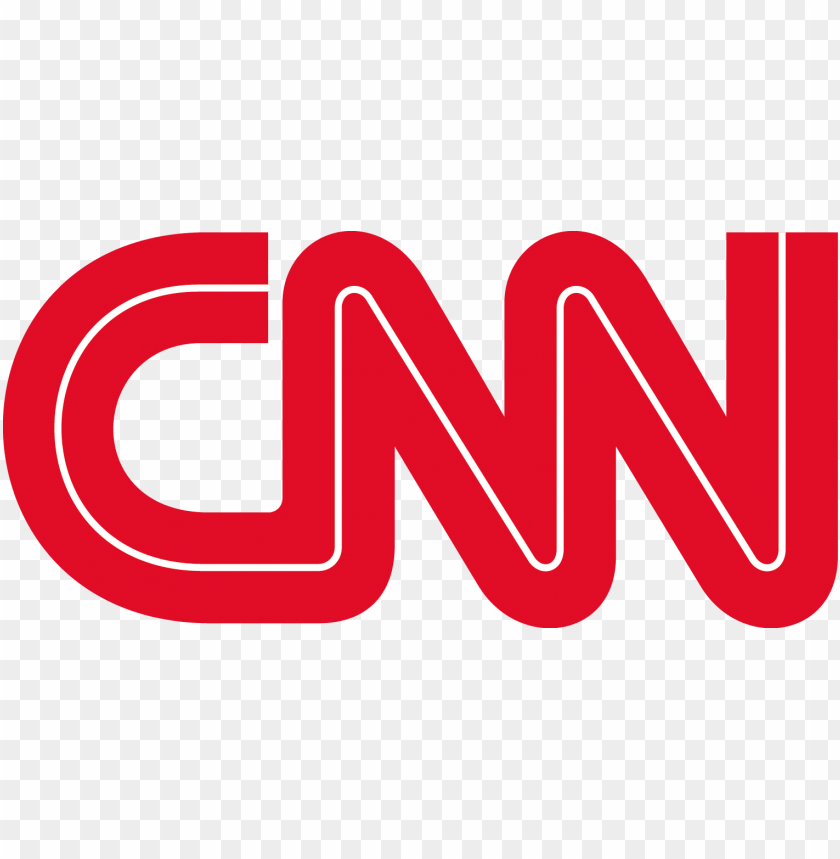 1 year ago
6
1 year ago
6

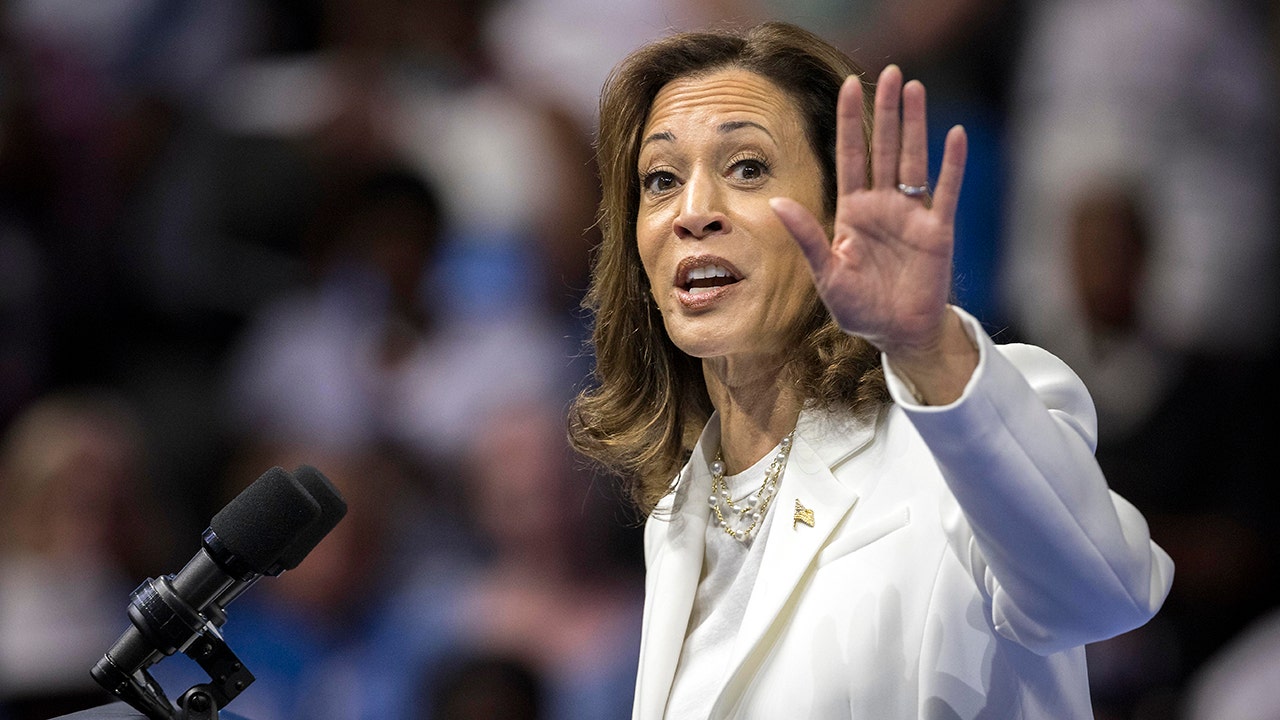







 English (US) ·
English (US) ·